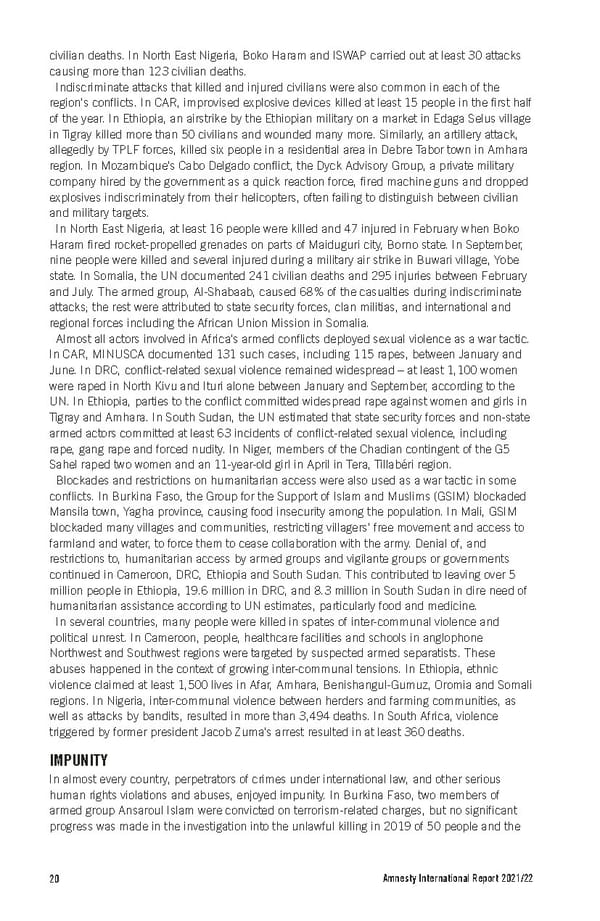civilian deaths. In North East Nigeria, Boko Haram and ISWAP carried out at least 30 attacks causing more than 123 civilian deaths. Indiscriminate attacks that killed and injured civilians were also common in each of the region’s conflicts. In CAR, improvised explosive devices killed at least 15 people in the first half of the year. In Ethiopia, an airstrike by the Ethiopian military on a market in Edaga Selus village in Tigray killed more than 50 civilians and wounded many more. Similarly, an artillery attack, allegedly by TPLF forces, killed six people in a residential area in Debre Tabor town in Amhara region. In Mozambique’s Cabo Delgado conflict, the Dyck Advisory Group, a private military company hired by the government as a quick reaction force, fired machine guns and dropped explosives indiscriminately from their helicopters, often failing to distinguish between civilian and military targets. In North East Nigeria, at least 16 people were killed and 47 injured in February when Boko Haram fired rocket-propelled grenades on parts of Maiduguri city, Borno state. In September, nine people were killed and several injured during a military air strike in Buwari village, Yobe state. In Somalia, the UN documented 241 civilian deaths and 295 injuries between February and July. The armed group, Al-Shabaab, caused 68% of the casualties during indiscriminate attacks; the rest were attributed to state security forces, clan militias, and international and regional forces including the African Union Mission in Somalia. Almost all actors involved in Africa’s armed conflicts deployed sexual violence as a war tactic. In CAR, MINUSCA documented 131 such cases, including 115 rapes, between January and June. In DRC, conflict-related sexual violence remained widespread – at least 1,100 women were raped in North Kivu and Ituri alone between January and September, according to the UN. In Ethiopia, parties to the conflict committed widespread rape against women and girls in Tigray and Amhara. In South Sudan, the UN estimated that state security forces and non-state armed actors committed at least 63 incidents of conflict-related sexual violence, including rape, gang rape and forced nudity. In Niger, members of the Chadian contingent of the G5 Sahel raped two women and an 11-year-old girl in April in Tera, Tillabéri region. Blockades and restrictions on humanitarian access were also used as a war tactic in some conflicts. In Burkina Faso, the Group for the Support of Islam and Muslims (GSIM) blockaded Mansila town, Yagha province, causing food insecurity among the population. In Mali, GSIM blockaded many villages and communities, restricting villagers’ free movement and access to farmland and water, to force them to cease collaboration with the army. Denial of, and restrictions to, humanitarian access by armed groups and vigilante groups or governments continued in Cameroon, DRC, Ethiopia and South Sudan. This contributed to leaving over 5 million people in Ethiopia, 19.6 million in DRC, and 8.3 million in South Sudan in dire need of humanitarian assistance according to UN estimates, particularly food and medicine. In several countries, many people were killed in spates of inter-communal violence and political unrest. In Cameroon, people, healthcare facilities and schools in anglophone Northwest and Southwest regions were targeted by suspected armed separatists. These abuses happened in the context of growing inter-communal tensions. In Ethiopia, ethnic violence claimed at least 1,500 lives in Afar, Amhara, Benishangul-Gumuz, Oromia and Somali regions. In Nigeria, inter-communal violence between herders and farming communities, as well as attacks by bandits, resulted in more than 3,494 deaths. In South Africa, violence triggered by former president Jacob Zuma’s arrest resulted in at least 360 deaths. IMPUNITY In almost every country, perpetrators of crimes under international law, and other serious human rights violations and abuses, enjoyed impunity. In Burkina Faso, two members of armed group Ansaroul Islam were convicted on terrorism-related charges, but no significant progress was made in the investigation into the unlawful killing in 2019 of 50 people and the Amnesty International Report 2021/22 20
 Amnesty International Report 2021/22 Page 19 Page 21
Amnesty International Report 2021/22 Page 19 Page 21